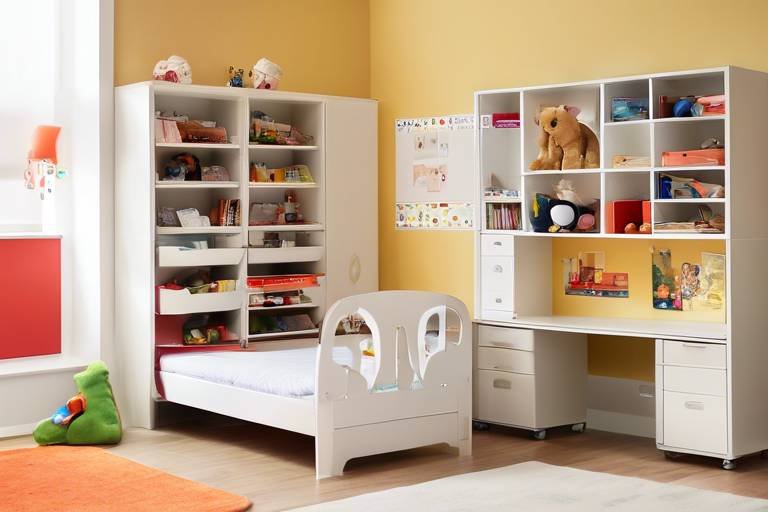Sharing Responsibilities: Equitable Chores in the Family
In today's fast-paced world, the concept of family has evolved, but one thing remains constant: the need for shared responsibilities. When it comes to household chores, an equitable distribution is not just a luxury—it's a necessity. Imagine a home where everyone pitches in, where the burden of chores doesn’t fall on just one person, and where each family member feels valued and appreciated. Sounds like a dream, right? Well, it can be a reality! By fostering cooperation and understanding among family members, we can create a more harmonious living environment that reduces stress and enhances family dynamics.
Equitable chore sharing is all about teamwork. When everyone contributes, it not only lightens the load but also builds a sense of community within the home. Think of it as a well-oiled machine: each part has its role, and when they work together, the entire system runs smoothly. No one wants to feel overwhelmed by endless tasks while others sit back and relax. By ensuring that chores are shared fairly, we can maintain a balanced household where everyone feels like they belong.
Moreover, sharing responsibilities can lead to valuable life lessons for younger family members. It teaches them the importance of teamwork, accountability, and respect for one another's contributions. When children see their parents actively participating in household chores, they learn to value hard work and understand that maintaining a home is a collective effort. This not only prepares them for their future but also strengthens family bonds in the present.
So, how do we achieve this equitable distribution of chores? It starts with communication. Families should have open discussions about their individual preferences, strengths, and schedules. This dialogue can lead to a more agreeable distribution of tasks, making sure that no one feels stuck with chores they dislike. After all, if someone enjoys cooking but hates vacuuming, why not let them take charge of the kitchen while someone else handles the cleaning?
In conclusion, sharing responsibilities in the family is not just about getting things done; it's about creating a supportive environment where everyone feels included and valued. By working together, families can reduce stress, improve relationships, and cultivate a greater sense of teamwork. So, let’s roll up our sleeves and make household chores a shared adventure—because together, we can create a home that thrives on cooperation and respect.
- Why is equitable chore distribution important? It ensures that no one feels overwhelmed and promotes teamwork within the family.
- How can we identify household chores? Start by listing all tasks, from daily to weekly chores, to understand what needs to be done.
- What if conflicts arise over chores? Address them promptly through open communication to prevent resentment and ensure everyone feels valued.
- How can we encourage accountability? By setting clear expectations and allowing family members to take responsibility for their assigned tasks.

The Importance of Equitable Chore Distribution
Understanding why equitable chore distribution is vital can help families function better. Imagine living in a household where everyone pitches in, making the workload lighter and the atmosphere more enjoyable. When chores are shared fairly, it promotes a sense of teamwork and ensures that no one feels overwhelmed or underappreciated in maintaining the household. Think of it like a game where everyone has a role to play; when each family member contributes, the game is more fun and engaging!
Moreover, equitable distribution of chores can lead to less stress and anxiety. Have you ever felt the weight of the world on your shoulders because you were the only one cleaning up after dinner? It can be exhausting! By sharing responsibilities, family members can support each other, leading to a more harmonious living environment. This not only fosters cooperation but also strengthens family bonds, as everyone feels involved and valued.
To illustrate the importance of this concept, let's take a closer look at some key benefits:
- Reduced Resentment: When chores are shared, no one feels like they are doing more than their fair share, which can lead to resentment.
- Improved Relationships: Working together on household tasks can enhance communication and understanding among family members.
- Enhanced Life Skills: Sharing chores teaches children responsibility and the importance of contributing to the family unit.
In essence, equitable chore distribution is not just about keeping the house clean; it’s about creating a balanced and supportive family dynamic. Families that embrace this approach often find that they not only maintain a cleaner home but also enjoy a more positive and collaborative atmosphere. So, the next time you’re feeling overwhelmed by household tasks, consider discussing how responsibilities can be shared more equitably. After all, a happy home is one where everyone works together!

Identifying Household Chores
Recognizing the various household chores that need to be done is the first step towards achieving an equitable sharing of responsibilities among family members. Imagine a home where everyone knows their role, and tasks flow smoothly like a well-oiled machine. By identifying these chores, families can create a more organized and harmonious living environment. From the routine tasks that keep the house running daily to the more extensive jobs that pop up weekly, understanding what needs to be done is crucial.
When we think about household chores, it’s easy to overlook the smaller tasks that, when combined, can feel overwhelming. For instance, daily chores such as washing dishes, making beds, and tidying up are essential for maintaining a clean and pleasant home. These tasks may seem minor on their own, but collectively, they contribute significantly to the overall atmosphere of the household.
On the other hand, we have weekly chores, which require a bit more planning and effort. These include tasks like vacuuming, laundry, and grocery shopping. Assigning these responsibilities is vital because they can easily be neglected if not scheduled properly. By recognizing the difference between daily and weekly chores, families can better allocate their time and energy, ensuring that no single person feels overwhelmed.
To make this process even clearer, let’s take a look at a simple
| Type of Chore | Examples |
|---|---|
| Daily Chores | Washing dishes, making beds, tidying up, sweeping floors |
| Weekly Chores | Vacuuming, laundry, grocery shopping, cleaning bathrooms |
By understanding and identifying these chores, families can create a more structured approach to household management. This not only helps in planning but also ensures that each family member knows what is expected of them. The goal is to foster a sense of teamwork and cooperation, where everyone feels valued and appreciated for their contributions. Now, who wouldn't want to live in a home where responsibilities are shared, and everyone is on the same page?
- Why is it important to share household chores?
Sharing chores helps to reduce stress and prevents any single person from feeling overwhelmed, fostering a sense of teamwork within the family. - How can we effectively communicate about chores?
Open discussions about preferences and schedules can lead to a more agreeable distribution of tasks, ensuring everyone feels comfortable with their responsibilities. - What if conflicts arise over chores?
Addressing conflicts promptly and constructively is key. Clear communication can help prevent resentment and ensure that everyone feels heard. - What are the benefits of having a chore schedule?
A chore schedule provides clarity on responsibilities, helping to ensure that tasks are completed and everyone contributes their fair share.

Daily Chores vs. Weekly Chores
When it comes to managing household responsibilities, understanding the distinction between daily chores and weekly chores is crucial. Daily chores are those tasks that require constant attention and are integral to keeping the household running smoothly. Think of them as the heartbeat of your home; without them, chaos can quickly ensue. These chores often include activities like washing dishes, making beds, and tidying up common areas. They may seem small, but they play a significant role in maintaining a clean and organized living space.
On the other hand, weekly chores are those that can be scheduled at a more leisurely pace, allowing for a balanced distribution of responsibilities. These tasks, such as vacuuming, doing laundry, and grocery shopping, are essential but don’t need to be tackled every single day. By categorizing chores into daily and weekly tasks, families can create a more manageable and less overwhelming household routine.
To illustrate this further, consider the following table that breaks down common daily and weekly chores:
| Type of Chore | Examples |
|---|---|
| Daily Chores |
|
| Weekly Chores |
|
By clearly defining these chores, families can allocate responsibilities more effectively, ensuring that everyone contributes to the upkeep of the home. This not only fosters a sense of teamwork but also prevents any one person from feeling overwhelmed by the burden of household tasks. After all, sharing responsibilities is about creating a harmonious living environment where everyone feels valued and involved.

Examples of Daily Chores
This article explores the importance of equitable distribution of household chores among family members, fostering cooperation, reducing stress, and enhancing family dynamics for a more harmonious living environment.
Understanding why equitable chore distribution is vital can help families function better. It promotes teamwork and ensures that no one feels overwhelmed or underappreciated in maintaining the household.
Recognizing the various chores that need to be done is the first step in equitable sharing. From cleaning to cooking, knowing what tasks exist allows for better planning and distribution among family members.
Differentiating between daily and weekly chores helps in organizing tasks effectively. Daily chores require consistent attention, while weekly chores can be scheduled, allowing for a balanced sharing of responsibilities.
Daily chores are the backbone of a well-maintained home. They may seem small, but these tasks create a foundation for a clean and organized living space. For instance, washing dishes after every meal is crucial; it prevents the buildup of grime and keeps your kitchen inviting. Similarly, making beds each morning not only tidies up the bedroom but also sets a positive tone for the day. Another essential daily chore is tidying up common areas like the living room or dining area, which ensures that your home feels welcoming and comfortable.
Moreover, daily chores can include tasks like taking out the trash, which is vital for maintaining hygiene, and feeding pets, which adds a sense of routine and care to your household. These small, consistent efforts contribute significantly to maintaining a clean and organized home environment. By sharing these daily responsibilities, family members can foster a sense of teamwork and cooperation, making the home a more pleasant place to live.
A chore schedule is an effective tool for managing household responsibilities. It provides clarity on who is responsible for what, ensuring that everyone contributes their fair share to the household.
Open communication is essential when sharing chores. Discussing preferences, strengths, and schedules can lead to a more agreeable distribution of tasks, fostering a collaborative family atmosphere.
Conflicts may arise when responsibilities are not clearly defined. Addressing these issues promptly and constructively can prevent resentment and ensure that everyone feels valued and heard in the process.
Encouraging family members to take responsibility for their assigned chores fosters a sense of accountability. This not only helps in completing tasks but also builds trust and respect among family members.
Sharing household responsibilities leads to numerous benefits, including reduced stress, improved relationships, and a greater sense of teamwork. Families that work together often experience a more positive and supportive home environment.
- Why is it important to share chores? Sharing chores prevents any single person from feeling overwhelmed and helps build teamwork within the family.
- How can we create a chore schedule? Discuss each member's strengths and availability to create a balanced schedule that works for everyone.
- What if conflicts arise over chores? Address conflicts openly and constructively, ensuring everyone feels heard and valued in the conversation.
- What are some tips for encouraging accountability? Set clear expectations, provide reminders, and celebrate when chores are completed to foster a sense of responsibility.

Examples of Weekly Chores
Weekly chores are those essential tasks that, while not required every day, play a significant role in keeping a household running smoothly. These chores often accumulate throughout the week, so tackling them systematically can prevent a chaotic environment. For instance, think about vacuuming; it's not something you do daily, but if left unchecked, dust and dirt can build up, leading to an unpleasant living space. By assigning this task to a family member on a specific day, you ensure that it gets done regularly without anyone feeling overwhelmed.
Another common weekly chore is laundry. This task can be daunting if it piles up, turning into a mountain of clothes that seems insurmountable. By designating a laundry day, family members can take turns managing the washing, drying, and folding. This not only distributes the workload but also teaches valuable life skills to younger members of the family.
Additionally, grocery shopping is a task that can easily become a chore if not organized properly. Planning meals for the week ahead and assigning the grocery shopping to one family member can streamline the process. Not only does this ensure that everyone has a say in the meals prepared, but it also fosters a sense of teamwork as the family collaborates on the shopping list. Here’s a quick look at some common weekly chores:
- Vacuuming
- Laundry
- Grocery Shopping
- Bathroom Cleaning
- Dusting
- Yard Work
Incorporating these chores into a weekly schedule can create a rhythm within the household, making everyone aware of their responsibilities and the importance of contributing to the family unit. This not only helps in maintaining cleanliness but also strengthens family bonds as everyone works together towards a common goal.
Q: How can I motivate my family to do their chores?
A: Motivation can come from creating a fun and rewarding system. Consider using a chore chart with incentives or rewards for completing tasks. Making chores a family affair can also help—turn on some music and tackle them together!
Q: What if conflicts arise over chore assignments?
A: Open communication is key. Sit down as a family and discuss responsibilities. Listen to each person’s concerns and preferences, and try to find a balance that works for everyone.
Q: How often should we revisit our chore schedule?
A: It’s a good idea to revisit the chore schedule every month or whenever you notice that it’s not working effectively. Life changes, and so do family dynamics, so flexibility is important.

Creating a Chore Schedule
Creating a chore schedule is like crafting a roadmap for your family's daily life. It provides direction, clarity, and a sense of purpose, ensuring that everyone knows their roles and responsibilities. Think of it as a team playbook where each member has a position to fill. Without this schedule, chaos can easily reign supreme in your household, leading to confusion and frustration.
To start, gather all family members and discuss the various chores that need to be done. This collaborative approach not only engages everyone but also allows individuals to voice their preferences and strengths. For instance, some might enjoy cooking, while others prefer cleaning or organizing. By recognizing these strengths, you can create a schedule that feels less like a burden and more like a shared endeavor.
Once you have a list of chores, it’s time to visualize the schedule. You can use a simple table to outline who is responsible for each task and when it needs to be done. Here’s an example of what a chore schedule could look like:
| Day | Chore | Assigned To |
|---|---|---|
| Monday | Vacuum Living Room | Mom |
| Tuesday | Wash Dishes | Dad |
| Wednesday | Clean Bathrooms | Teenager |
| Thursday | Grocery Shopping | Child |
| Friday | Dust Surfaces | Mom |
| Saturday | Laundry | Teenager |
| Sunday | Meal Prep | Dad |
Having a visual representation like this not only keeps everyone accountable but also allows for easy adjustments if someone’s schedule changes. Flexibility is key! Life is unpredictable, and sometimes you might need to swap chores or shift responsibilities. Encourage open communication about any changes to the schedule. This way, everyone remains in the loop, and no one feels overwhelmed.
Moreover, consider incorporating a rewards system for completing chores. It could be as simple as a family movie night or a special treat. This not only motivates family members to fulfill their responsibilities but also turns chore completion into a fun family activity. After all, who said chores have to be boring?
In conclusion, creating a chore schedule is an essential step toward a harmonious household. It fosters accountability, promotes teamwork, and ultimately leads to a cleaner and more organized home. So, gather your family, brainstorm those chores, and get scheduling! You’ll be amazed at how much smoother household management can become.
- How often should we update our chore schedule? It's a good idea to review and update your chore schedule every month or whenever there's a significant change in family routines.
- What if someone forgets their chore? Open communication is key. Remind them gently, and consider adding a reminder system, like a calendar alert or a chore chart on the fridge.
- Can we rotate chores? Absolutely! Rotating chores can keep things fresh and give everyone a chance to try different tasks. It also helps in building appreciation for each other's efforts.
- What if there are conflicts over chores? Address conflicts openly and constructively. Discuss preferences and workloads, and make adjustments as necessary to ensure everyone feels valued.

Communicating About Responsibilities
When it comes to sharing household chores, communication is the lifeblood that keeps everything running smoothly. Without it, misunderstandings can fester, leading to frustration and resentment. Imagine trying to navigate a ship without a compass; that's what a household feels like without clear communication about responsibilities. To create a harmonious environment, it’s essential to openly discuss who does what and when.
Start by gathering the family together for a casual chat. This isn’t a meeting where you pull out charts and graphs; think of it more like a family brainstorming session. Encourage everyone to voice their thoughts on chores they enjoy or those they’d rather avoid. You might be surprised to discover that your teenager actually loves cooking but has been too shy to speak up. By fostering an open dialogue, you create a space where everyone feels comfortable sharing their preferences and schedules.
It’s also important to consider each family member’s strengths and weaknesses. For instance, if someone is particularly good at organizing, they might take charge of tidying up and decluttering. On the other hand, if another family member enjoys gardening, let them handle the outdoor chores. This not only makes the tasks more enjoyable but also increases efficiency. When everyone plays to their strengths, chores become less of a burden and more of a team effort.
But what happens when conflicts arise? It’s inevitable that disagreements will surface, especially if expectations aren’t clearly defined. Addressing these conflicts promptly is crucial. Set aside time to revisit the chore distribution and make adjustments as necessary. Maybe someone feels overwhelmed, or perhaps a task is taking longer than anticipated. Openly discussing these issues ensures that everyone feels valued and heard, which is vital for maintaining family harmony.
To keep the momentum going, consider creating a chore chart or a digital calendar that everyone can access. This can serve as a visual reminder of responsibilities and deadlines, making it easier to track progress. Plus, it adds an element of accountability. When everyone sees their tasks laid out clearly, it encourages them to follow through. You could even add a fun element by including a reward system for completing chores, like a family movie night or a special treat.
In summary, effective communication about responsibilities isn’t just about assigning tasks; it’s about building a collaborative family culture. By openly discussing preferences, addressing conflicts, and encouraging accountability, you can transform the way your family approaches household chores. It’s not just about getting things done; it’s about fostering a sense of teamwork that makes the home a happier place to be.
- How can we start the conversation about chores? Begin with a family meeting where everyone can share their thoughts and preferences.
- What if someone isn’t pulling their weight? Address the issue directly and discuss how to redistribute responsibilities if needed.
- Is it necessary to have a chore chart? While not mandatory, a chore chart can help everyone stay on track and accountable.
- How do we handle conflicts over chores? Approach conflicts calmly, and encourage open dialogue to find a resolution that works for everyone.

Addressing Conflicts Over Chores
When it comes to sharing household responsibilities, conflicts can sometimes feel as inevitable as dirty dishes piling up in the sink. It's crucial to recognize that these disagreements often stem from misunderstandings or differing expectations. So, how do we tackle these issues head-on? One effective approach is to foster an environment of open dialogue. By encouraging family members to express their feelings and concerns about chores, you can uncover underlying issues that may need addressing.
Imagine sitting around the dinner table, discussing not just what needs to be done, but how each person feels about their share of the workload. This conversation can be enlightening! You might discover that one family member feels overwhelmed because they have additional commitments outside the home, while another might be feeling underappreciated for their contributions. By sharing these insights, family members can better understand each other's perspectives, leading to a more harmonious living situation.
Another effective strategy is to establish clear guidelines for chore responsibilities. This can be done by creating a simple chore chart that outlines who is responsible for what and when. Having a visual representation not only clarifies expectations but also holds everyone accountable. Here’s a quick example of how you might structure a chore chart:
| Family Member | Daily Chores | Weekly Chores |
|---|---|---|
| Mom | Washing dishes | Vacuuming |
| Dad | Taking out the trash | Laundry |
| Child 1 | Making beds | Grocery shopping |
| Child 2 | Tidying up | Bathroom cleaning |
However, even with a chore chart in place, conflicts can still arise. If one family member feels that they are consistently taking on more than their fair share, it's essential to address this issue promptly. Acknowledge their feelings and discuss possible adjustments to the chore distribution. Remember, it’s not about assigning blame but rather about finding a solution that works for everyone. Think of it like a team sport; everyone has a role to play, and when one player is out of sync, it affects the entire team.
Lastly, it’s vital to approach conflicts with a solution-oriented mindset. Instead of focusing on what went wrong, encourage family members to brainstorm together on how to improve the situation. This could be as simple as rotating chores weekly or allowing family members to swap tasks they dislike. The goal is to create a system that feels fair and manageable for everyone involved.
In conclusion, addressing conflicts over chores is not just about dividing tasks; it’s an opportunity to foster communication, understanding, and teamwork within the family. By keeping the lines of communication open and being receptive to each other’s needs, families can navigate these challenges more effectively, leading to a more peaceful and cooperative home environment.
- How can I encourage my family to participate in chores? Start by discussing the importance of teamwork and how sharing responsibilities can lighten the load for everyone.
- What should I do if someone consistently neglects their chores? Address the issue directly but kindly, and try to understand their perspective. Offer to help them manage their tasks better.
- Is it helpful to reward children for completing chores? Yes! Positive reinforcement can motivate children to take responsibility and make chores feel less like a burden.
- How often should we review our chore distribution? It’s a good idea to review the distribution every few months or whenever there are significant changes in family schedules.

Encouraging Accountability
This article explores the importance of equitable distribution of household chores among family members, fostering cooperation, reducing stress, and enhancing family dynamics for a more harmonious living environment.
Understanding why equitable chore distribution is vital can help families function better. It promotes teamwork and ensures that no one feels overwhelmed or underappreciated in maintaining the household.
Recognizing the various chores that need to be done is the first step in equitable sharing. From cleaning to cooking, knowing what tasks exist allows for better planning and distribution among family members.
Differentiating between daily and weekly chores helps in organizing tasks effectively. Daily chores require consistent attention, while weekly chores can be scheduled, allowing for a balanced sharing of responsibilities.
Daily chores include tasks like washing dishes, making beds, and tidying up. These small, consistent efforts contribute significantly to maintaining a clean and organized home environment.
Weekly chores may involve vacuuming, laundry, and grocery shopping. Assigning these tasks ensures that they are not neglected and helps distribute the workload evenly among family members.
A chore schedule is an effective tool for managing household responsibilities. It provides clarity on who is responsible for what, ensuring that everyone contributes their fair share to the household.
Open communication is essential when sharing chores. Discussing preferences, strengths, and schedules can lead to a more agreeable distribution of tasks, fostering a collaborative family atmosphere.
Conflicts may arise when responsibilities are not clearly defined. Addressing these issues promptly and constructively can prevent resentment and ensure that everyone feels valued and heard in the process.
Encouraging family members to take responsibility for their assigned chores fosters a sense of accountability. This not only helps in completing tasks but also builds trust and respect among family members. When everyone knows what they are responsible for, it creates a sense of ownership. Think of it like being part of a team; each player has a role, and when one person doesn’t pull their weight, it affects the entire group.
To further enhance accountability, consider implementing a few strategies:
- Regular Check-ins: Schedule weekly family meetings to discuss progress on chores. This keeps everyone informed and allows for adjustments if someone is struggling.
- Positive Reinforcement: Recognize and celebrate when chores are completed well. A simple "thank you" can go a long way in motivating family members to keep up their contributions.
- Tracking Progress: Use a chore chart or app to track who has completed what. Visual reminders can motivate everyone to stay on top of their responsibilities.
By fostering a culture of accountability, families can thrive together, turning chores from a burden into a shared journey. After all, when everyone pitches in, the home becomes a more enjoyable and less stressful place to be.
Sharing household responsibilities leads to numerous benefits, including reduced stress, improved relationships, and a greater sense of teamwork. Families that work together often experience a more positive and supportive home environment.
- How can we start sharing chores effectively? Begin with a family meeting to discuss everyone's preferences and strengths. Create a chore list and assign tasks based on individual capabilities.
- What if someone consistently doesn’t do their chores? Address the issue directly but kindly. Discuss any obstacles they may be facing and find solutions together.
- How can we make chores more enjoyable? Turn on some music, set a timer for a fun challenge, or make it a game. The more fun you have, the less it feels like a chore!

Benefits of Shared Responsibilities
Sharing household responsibilities is not just about dividing tasks; it’s about creating a more harmonious and efficient living environment. When family members collaborate on chores, they experience a myriad of benefits that go beyond simply keeping the house tidy. **Reduced stress** is one of the most significant advantages. Imagine coming home after a long day, knowing that the dishes are done, the laundry is folded, and the living room is clean. This sense of relief can transform your mood and create a welcoming atmosphere.
Moreover, equitable chore distribution fosters **stronger relationships** among family members. When everyone pitches in, it creates a sense of teamwork and unity. You’re not just completing tasks; you’re working together towards a common goal. This collaboration can lead to better communication and understanding, as family members learn to appreciate each other’s contributions and efforts. It's like being part of a sports team; each player has a role, and when everyone plays their part, the team succeeds.
Another benefit is the **development of life skills**, especially for children. When kids are involved in household chores, they learn responsibility, time management, and the importance of contributing to the family unit. These skills are not only valuable at home but also in their future workplaces and relationships. You might say it’s like planting seeds for their personal growth; the more they practice, the more they flourish.
In addition, sharing responsibilities can lead to a greater sense of **accountability**. When family members know they are responsible for certain tasks, they are more likely to follow through. This accountability builds trust and respect within the household. It’s essential to recognize that when everyone is held accountable for their contributions, it reduces the likelihood of resentment and frustration that can arise from unequal workloads.
To illustrate the benefits of shared responsibilities, consider the following table that summarizes the positive impacts:
| Benefit | Description |
|---|---|
| Reduced Stress | Less burden on individuals leads to a more relaxed atmosphere. |
| Stronger Relationships | Enhanced teamwork fosters better communication and bonds. |
| Development of Life Skills | Children learn responsibility and time management through participation. |
| Increased Accountability | Each member feels responsible for their tasks, building trust. |
Ultimately, when families embrace shared responsibilities, they cultivate a **positive and supportive home environment**. It’s about more than just getting chores done; it’s about creating a space where everyone feels valued, respected, and part of a team. So, why not take that step towards a more collaborative household? It might just be the change you need to enhance your family dynamics.
- What are the best ways to start sharing chores in the family? Begin by discussing each member's strengths and preferences, then create a chore schedule that reflects these insights.
- How can I encourage my children to participate in household chores? Make chores fun by turning them into games or offering rewards for completed tasks.
- What should I do if conflicts arise over chores? Address the issues openly and constructively, focusing on solutions rather than blame.
- How can we maintain accountability for chores? Regular check-ins and discussions about responsibilities can help everyone stay on track.
Frequently Asked Questions
- Why is equitable chore distribution important in a family?
Equitable chore distribution is crucial because it fosters teamwork and cooperation among family members. When chores are shared fairly, no one feels overwhelmed or underappreciated, leading to a more harmonious living environment.
- What are some examples of daily and weekly chores?
Daily chores typically include tasks such as washing dishes, making beds, and tidying up. On the other hand, weekly chores might involve vacuuming, doing laundry, and grocery shopping. Recognizing the difference helps in organizing responsibilities effectively.
- How can I create an effective chore schedule?
To create an effective chore schedule, list all the household tasks and assign them based on family members' preferences and availability. Make sure to review and adjust the schedule regularly to keep everyone engaged and accountable.
- What should we do if conflicts arise over chores?
If conflicts arise, it’s important to address them openly and constructively. Discussing the issues calmly can help clarify responsibilities and ensure that everyone feels valued and heard, preventing resentment from building up.
- How can I encourage accountability in my family regarding chores?
Encouraging accountability can be achieved by setting clear expectations and checking in regularly on progress. Recognizing and praising family members for completing their chores can also motivate everyone to take their responsibilities seriously.
- What are the benefits of sharing household responsibilities?
Sharing household responsibilities leads to reduced stress, improved relationships, and a greater sense of teamwork. Families that collaborate on chores often enjoy a more positive and supportive home environment, enhancing overall well-being.



















